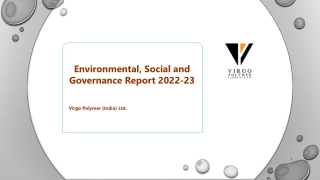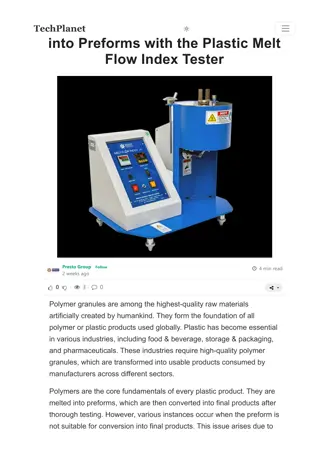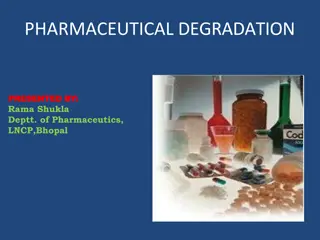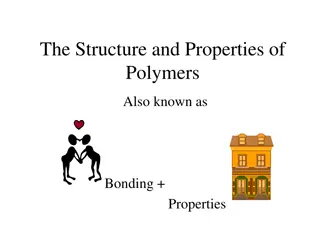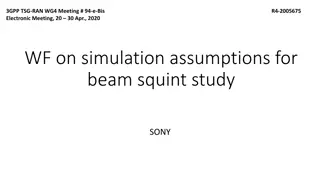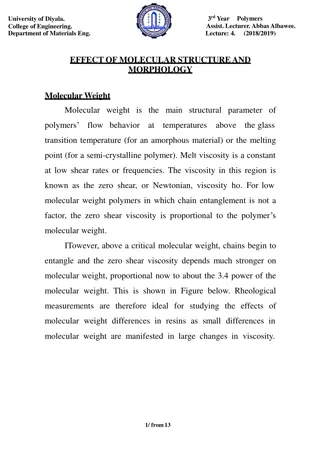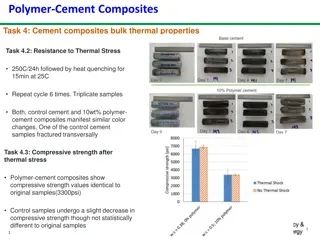Understanding Polymer Degradation Processes in Chemistry
Polymer degradation involves a reduction in molecular weight due to various factors like heating, mechanical stresses, radiation, oxygen, and moisture. Two main types of degradation include chain end degradation and random degradation, each affecting the polymer structure differently. Chain end degradation starts from chain ends, while random degradation occurs at random points along the polymer chain. Thermal degradation follows these processes, resulting in the breakdown of polymers into smaller fragments or monomers.
Download Presentation

Please find below an Image/Link to download the presentation.
The content on the website is provided AS IS for your information and personal use only. It may not be sold, licensed, or shared on other websites without obtaining consent from the author. Download presentation by click this link. If you encounter any issues during the download, it is possible that the publisher has removed the file from their server.
E N D
Presentation Transcript
Polymer Degradation II. M.Sc., Chemistry Dr. S. SIVAKUMAR Assistant Professor Department of Chemistry Hajee Karutha Rowther Howdia College Uthamapalayam 1
Polymer Degradation Degradation means that a reduction in the molecular weight. Uncontrolled change in the molecular weight or constitution of the polymer. Degradation during fabrication process is due to heating. During the daily usage polymer face mechanical stresses, solar radiations, oxygen and moisture. 2
Types of Polymer Degradation Two types namely chain end degradation or unzipping degradation or depolymerisation. Random Degradation chain end degradation Degradation starts from chain ends resulting in successive release of monomer units. 3
CHAIN END DEGRADATION It is reverse of propagation step. Hence it is depolymerisation Ex: poly methyl styrene is converted into monomer at 600C and on cooling at -700C polymer can be obtained. Polymethyl methacrylate at 3000C give back the monomer. Polymers formed by chain polymerisation undergo unzipping. 4
CHAIN END DEGRADATION Chain end degradation occurs when the backbone bonds are weaker than the bonds of the side groups. Polymer molecules carrying active chain ends with free radical, cation, anion undergo Chain end degradation. Enzyme beta amylase degrade starch to maltose beginning with chain ends. 5
Random degradation It occurs at any random point along the polymer chain instead of at the chain ends and hence the name Random degradation. Reverse of polycondensation process Polymer degrade to low molecular weight fragments. No monomer is liberated. Almost all polymer undergo random degradation 6
Random degradation For random degradation to occur the polymer chain need not carry any active site. 7
Thermal degradation Thermal degradation follows unzipping or random degradation. Unzipping gives pure monomer and random gives low molecular weight products. Many polymers have C-C chain as the backbone , their thermal stability is dependent on the stability of C-C bond. 8
Poly ethylene Poly iso butylene 9
Thermal degradation The number of substituents increases and the stability of the polymer backbone bond decreases. Polyethylene stable Poly methyl styrene Still less stable Polystyrene Less stable 10
Thermal degradation The bond dissociation energies decreases for C-C in CH3-CH3= 88 , CH3-CH2-CH3= 85 (CH3)3-C-CH3= 80, C6H5-CH2-CH3= 70 All substituents donot always reduce thermal stability of the polymeric system. Ex: Teflon is most stable polymer upto 4000C without undergoing degradation. Its high thermal stability is attributed to high dissociation energy . High electronegative nature of F protect C-C bond from external attack. The aromatic groups in a polymer backbone increases the thermal stability. 11
Thermal degradation Polycarbonate less stable Teflon Polyphenylene More stable Poly tetra fluorophenylene most stable due to phenyl and C-F bond. 12


